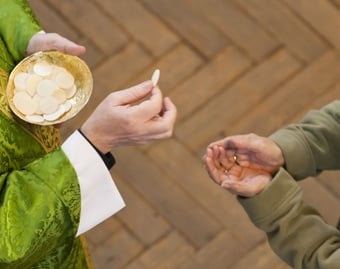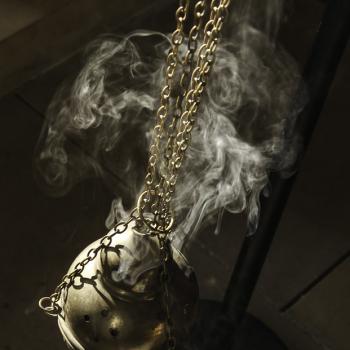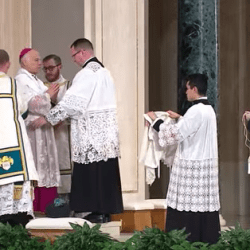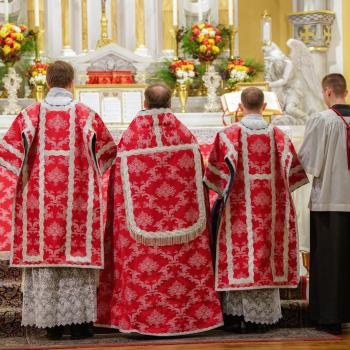A deacon from the midwest dropped me an e-mail this morning about a practice he’s witnessed frequently: priests at some Masses (notably weddings or funerals) who give strict instructions to the congregation about who may or may not come forward to receive Communion.
I told him that, while I know this is done, in my 54 years in the pews I can’t recall ever personally hearing a priest (or any other figure) speak about that before Communion. But it’s evidently more common than I thought.
The deacon notes:
Our local associate routinely gives the “admonition” at funerals…something like:
“We are about to receive and offer Holy Communion for those that have received confirmation and first holy Communion,however…. if you would like to come forward for a blessing, or if you are not a Catholic in good standing, simply cross your arms in front of you….” etc.
I hear it and see it done all of the time.
Weddings and funerals and Christmas and Easter are evangelizing moments—not a good time to put a wet blanket on those that came. So,
I advocate being very gentle and respectful and welcoming and inviting.I find this widespread practice of declaring that only Catholics are welcome etc….to be an “evangelization killer.”
I looked up this topic quickly and found this commentary: GIRM: It is the duty of pastors at an opportune moment to inform those present of the authenticity and the discipline that are strictly to be observed (84).
Fact is: the way, the words, the inflection all contribute to the evangelization message.
I find the idea of a verbal warning off-putting—but again, I don’t think I’ve ever heard something like this. In my experience of weddings and funerals, most non-Catholics are sophisticated enough to know there are restrictions on Catholic Communion; it’s not uncommon to see a sizable number of people in the pews stay put when others come up to receive.
I’ve also seen some parishes print a version of the following in the bulletin or in wedding programs, and it often pops up in a prominent place in parish missals. This was crafted some years back by the USCCB:
On November 14, 1996, the National Conference of Catholic Bishops approved the following guidelines on the reception of communion. These guidelines replace the guidelines approved by the Administrative Committee of the NCCB in November 1986. The guidelines, which are to be included in missalettes and other participation aids published in the United States, seek to remind all those who may attend Catholic liturgies of the present discipline of the Church with regard to the sharing of eucharistic communion.
For Catholics
As Catholics, we fully participate in the celebration of the Eucharist when we receive Holy Communion. We are encouraged to receive Communion devoutly and frequently. In order to be properly disposed to receive Communion, participants should not be conscious of grave sin and normally should have fasted for one hour. A person who is conscious of grave sin is not to receive the Body and Blood of the Lord without prior sacramental confession except for a grave reason where there is no opportunity for confession. In this case, the person is to be mindful of the obligation to make an act of perfect contrition, including the intention of confessing as soon as possible (canon 916). A frequent reception of the Sacrament of Penance is encouraged for all.For our fellow Christians
We welcome our fellow Christians to this celebration of the Eucharist as our brothers and sisters. We pray that our common baptism and the action of the Holy Spirit in this Eucharist will draw us closer to one another and begin to dispel the sad divisions which separate us. We pray that these will lessen and finally disappear, in keeping with Christ’s prayer for us “that they may all be one” (Jn 17:21).Because Catholics believe that the celebration of the Eucharist is a sign of the reality of the oneness of faith, life, and worship, members of those churches with whom we are not yet fully united are ordinarily not admitted to Holy Communion. Eucharistic sharing in exceptional circumstances by other Christians requires permission according to the directives of the diocesan bishop and the provisions of canon law (canon 844 § 4). Members of the Orthodox Churches, the Assyrian Church of the East, and the Polish National Catholic Church are urged to respect the discipline of their own Churches. According to Roman Catholic discipline, the Code of Canon Law does not object to the reception of communion by Christians of these Churches (canon 844 § 3).
For those not receiving Holy Communion
All who are not receiving Holy Communion are encouraged to express in their hearts a prayerful desire for unity with the Lord Jesus and with one another.For non-Christians
We also welcome to this celebration those who do not share our faith in Jesus Christ. While we cannot admit them to Holy Communion, we ask them to offer their prayers for the peace and the unity of the human family.
UPDATE: In response to this, a Brooklyn priest wrote to me:
At funerals, weddings and memorial Masses, I say the following:
“Those who are free to receive Holy Communion, and who wish to, are welcome to approach now.”
That says that not everyone is free to receive, not everyone who is free to wishes to, and I think takes the pressure off anyone who really doesn’t want to.
Makes sense to me. Could that admonition above be less ambiguous? Probably. It leaves itself open to interpretation. At any rate: it seems clear that something should probably be said at liturgies where there are a large number of non-Catholics.
UPDATE II: A reader alerted me to this item from The Tablet in London:
Restrictions on Christians from other denominations receiving communion in the Catholic Church could be relaxed, the Archbishop of Birmingham has said.
Archbishop Bernard Longley, who is co-chairman of the Anglican Roman Catholic International Commission (Arcic), said he foresaw a loosening of guidelines that already exist allowing baptised Christians to receive communion, although stressed he could not predict the pace of such a change.
It’s worth noting that there is a very narrow exception for non-Catholic Communion reception already in place:
When other Christians who believe what the Catholic church teaches concerning the Holy Eucharist are deprived of access to a church of their own denomination for a significant period of time, they too may be admitted to Communion in the Catholic Church in exceptional circumstances (cf. Canon 844 §4). These exceptional circumstances are also described by the Catechism of the Catholic Church:
When, in the Ordinary’s judgment, a grave necessity arises, Catholic ministers may give the sacraments of Eucharist, Penance, and Anointing of the Sick to other Christians not in full communion with the Catholic Church, who ask for them of their own will, provided they give evidence of holding the Catholic faith regarding these sacraments and possess the required dispositions. (Catechism of the Catholic Church, number 1401)
UPDATE III: More reaction.
One priest wrote on FB:
Especially at Funerals and Weddings where I know there are non-Catholics, I say: “It is time for we Catholics to receive Holy Communion. You may receive Holy Communion if you are a Catholic, if you’ve received your First Holy Communion, and if you are prepared to receive Holy Communion now.”
Another offered this:
Just before Communion I say, “If you are coming forward to receive the Body and Blood of Christ in the Eucharist, please come by way of the center aisle and return to your seats by the side aisles. If you are not coming forward to receive Communion, please be seated now.” I’ve noticed that MANY understand the second announcement as indicating that NOT all are expected to come forward, that remaining in one’s seat is an honorable option and something we expect some will do. In a subtle way this answers the “Should I or shouldn’t I, am I supposed to or not” question in the minds and hearts of those present, whether they are visiting from another faith or are Catholics not prepared to receive Communion.
But then there was this e-mail from a funeral director:
In response to the communion exhortation, I hate it. I have been a funeral director for more than 25 years and within the past 5-6 years, it is sad to admit I’m a Catholic when conducting a funeral Mass. The “announcement” prior to communion has become a statement of not just politics, but EX-clusion. I have seen young associates interrupt the choir to state if “you’re not in union with our beloved pope, please do not come forward.” And that’s the mild version. I recently conducted a funeral Mass where there were several hundred people and yet I didn’t hear one peep from the pastor; however, today we had an entire Gospel message on WHY non-Catholics should not receive.











